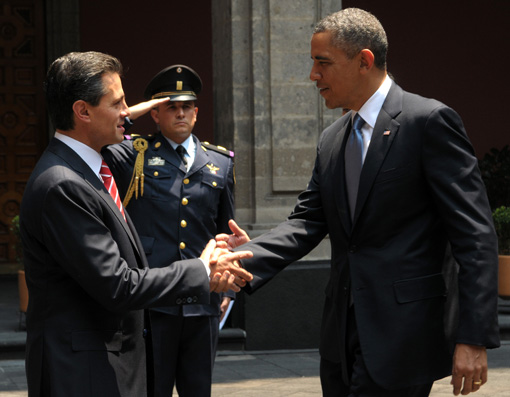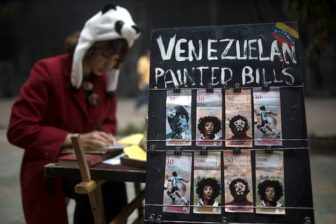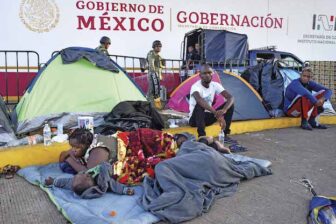Building up to their meeting in Mexico City on May 2, the administrations of both U.S. President Barack Obama and Mexican President Enrique Peña Nieto hinted that economic ties would be the focal point of their one-on-one meeting. In an interview with Americas Quarterly prior to the trip, Obama reiterated this, saying that he would “be discussing with President Peña Nieto how we can continue to reduce barriers to trade and investment.”
With commerce and economic cooperation pushing immigration and security to the backburner of the agenda, the two leaders made a strategic decision to avoid some of the more difficult issues gripping each country.
It comes as no surprise that the two leaders would want to play it safe. There is just too much at stake in the countries’ economic interdependencies: Mexico is the United States’ third-largest trading partner, while the U.S. is Mexico’s largest trading partner. These ties have grown stronger (and Mexico’s asymmetrical dependence on the U.S. economy has grown larger) since the North American Free Trade Agreement (NAFTA) was put into place, and pave the way toward even greater cooperation under the auspices of the Trans-Pacific Partnership, which could be completed by the end of this year.
Moreover, there would be no political gain for either Obama or Peña Nieto with a focus on security and/or immigration.
On immigration, President Obama does not have the leeway to promise anything or deliver on that promise as comprehensive immigration reform will depend on the extent to which the U.S. Congress can continue to work in a bipartisan manner in the months ahead.
In Mexico, Enrique Peña Nieto has not been as vocal as his predecessors about the urgent need to tackle the immigration problem perhaps because he understands that a vocal push for reform from the Mexican president may be seen as foreign meddling in what is often seen as a domestic issue. Like all Mexican presidents, he has used the scripted language about defending our countrymen’s rights outside of our borders. But he has not committed to steps such as requiring proper documentation for travelers along Mexico’s southern border that would help reduce the number of Central Americans who illegally cross into Mexico on route to the United States.
At the same time, agreement and mutual understanding on how to improve security is not the same as when the Partido Acción Nacional (National Action Party—PAN) was in power. Former Mexican President Felipe Calderón was more willing to work hand-in-hand with U.S. authorities on security issues, with U.S. drone planes often flying over Mexico’s national borders and information exchange and training common between U.S. and Mexican law enforcement officials. These practices are now under scrutiny by Peña Nieto. His administration has recently announced plans to reevaluate Calderón’s war on drugs strategy, including an intention to “restrict U.S. involvement in [Mexico’s] security efforts.”
Peña Nieto’s stated reason for reassessing Mexico’s security strategy is to focus on reducing violence rather than continuing a head-on war against the cartels. However, for a president still struggling with establishing legitimacy, and aware that the largest stain in Calderón’s legacy was the close to 70,000 deaths related to the war on drugs, it is also an intelligent political choice to throw a disappearing cloak over the issue of security. His priority is to focus the public’s attention on quick wins and success stories.
Obama, for his part, faces few domestic pressures when it comes to Mexico’s security issues and must justifiably focus his attention on Syria, North Korea and domestic challenges. When Obama was asked about security collaboration after his meeting with the Mexican president, his statement that “the nature of that cooperation will evolve” and that Mexico and the U.S. would “cooperate on a basis of mutual respect” is no coincidence. This is definitely a step back from what Obama referred to as “a shared responsibility” in 2009.
During their photo-op after Thursday’s meeting, Obama tried to focus on the commitments that he and Peña Nieto made for economic development. “Too often, two issues get attention: security or immigration,” he said. Unfortunately for both Mr. Obama and Mr. Peña Nieto, there is a reason for that: these issues are closer to constituents’ hearts than the promise of better macroeconomic levels, which may or may not trickle down and actually improve their daily lives.
The promise of a closer trade relationship, joint investment on competitiveness and a forecast of economic growth for both countries should positively affect the security environment in Mexico and the future flow of undocumented immigrants to the United States. But bilateral agreements on how to frame a common strategy to tackle both of these critical issues will have to wait for another day.








